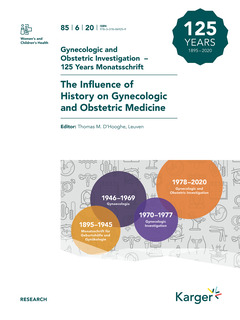Description
Gynecologic and Obstetric Investigation - 125 Years Monatsschrift
The Influence of History on Gynecologic and Obstetric Medicine. Special Topic Issue: Gynecologic and Obstetric Investigation 2020, Vol. 85, No. 6
Coordinator: D'Hooghe Thomas M.
Language: English
Subjects for Gynecologic and Obstetric Investigation - 125 Years...:
Keywords
Obstetrics, History of Medicine, Public Health, Reproduction
Publication date: 05-2021
100 p. · Paperback
100 p. · Paperback
Description
/li>
In this special issue of 'Gynecologic and Obstetric Investigation', we highlight its foundation in Berlin by Samuel Karger, August Martin and Max Saenger in 1895 and its forced transition to Basel because of the Nazi regime in Germany in 1937. This transition was made possible by Heinz Karger with a controversial role played by Ludwig Seitz. The special issue goes on to describe how after World War II, Thomas, Steven and Gabriella Karger have continued to develop the journal until today. A seminal contribution presents data illustrating the dramatic and far-reaching negative effects of Nazi ideology on reproductive public health, on the practice and research of obstetrics and gynecology, and on the exclusion of Jewish gynecologists from professional life, from the early 1930s till 1945. It shows how this was not only accepted by most but also actively supported and developed by some gynecologists in Germany at the time. Finally, we provide an overview of the most relevant/interesting topics that were addressed in our publications between 1895 and 1970. This special 125th anniversary issue of 'Gynecologic and Obstetric Investigation' should be read by all gynecologists and other interested health care professionals who wish to better understand how not only scientific progress but also political ideology, more specifically Nazi ideology supported and promoted by gynecologists, has shaped the history of this journal. This special issue also explores how political ideology has influenced dramatically the clinical and research practice in obstetrics and gynecology and reproductive health issues between 1930 and 1945. This should be not only a lesson learnt but also a wake-up call for the medical community to show courage in the resistance to totalitarian rule, always and everywhere.
© 2024 LAVOISIER S.A.S.
These books may interest you

Obstetric Care 91.52 €



